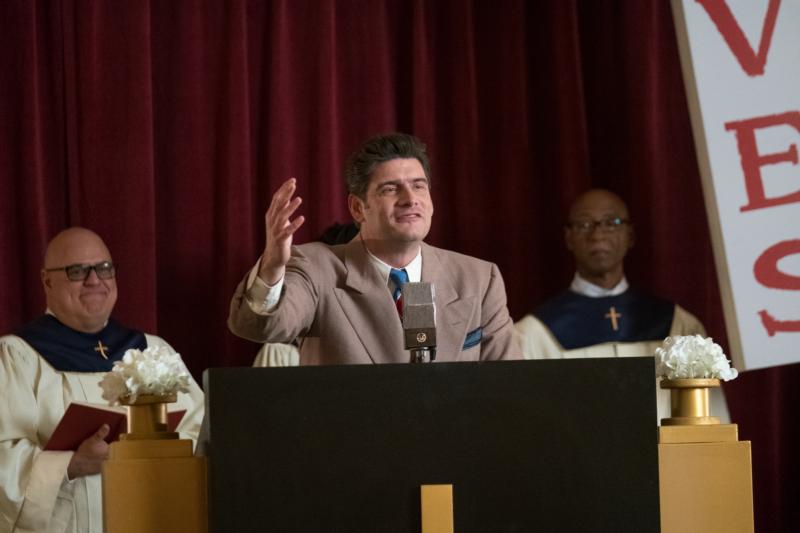
The Rev. Billy Graham is portrayed by his grandson Will Graham in a scene from the movie “Unbroken: Path to Redemption.” (CNS photo/Universal)
SAN DIEGO (CNS) — Almost four years ago, Louie Zamperini’s life story received its first big-screen treatment.
Director Angelina Jolie’s “Unbroken,” based on Laura Hillenbrand’s best-selling book, traced its subject’s life from his troubled childhood in Torrance, California, through his participation as a distance runner at the 1936 Summer Olympics, to the horrors he endured during World War II.
Focusing on the brutal treatment that he experienced as a prisoner of war at the hands of his Japanese captors, particularly a sadistic guard nicknamed “The Bird,” the film presented a compelling, real-life story of perseverance.
[hotblock]
But many Christian viewers were unsatisfied, as it opted not to depict Zamperini’s struggles as a returning veteran and gave short shrift to his Christian faith.
“Unbroken: Path to Redemption,” a new film in theaters Sept. 14, tells the rest of the story.
Will Graham was among those who initially felt disappointed by what the earlier film had left out. But Graham, grandson of legendary evangelist the Rev. Billy Graham, now understands why those omissions might have been necessary.
In a telephone interview with The Southern Cross, newspaper of the Diocese of San Diego, Graham acknowledged Zamperini, who died in 2014 at age 97, led such a full life that his “vast story” was more than a mere two-hour movie could ever hope to cover.
“I’m grateful for this opportunity that Angelina Jolie gave us,” he said. “Because of the success that she had, we get to ride the coattails, and to do the second half of the story, and to do it justice.”
In this “Unbroken,” Graham won’t be just a member of the audience. In a brief but pivotal scene in the film, he plays his own grandfather.
“Unbroken: Path to Redemption” is ultimately about Zamperini, but Rev. Graham, who died Feb. 21 and to whom the film is dedicated, is an important part of that story. His grandson, himself a preacher, called it “a great privilege” to be able to portray him, even if he had been hesitant to accept the role at first and only did so after determining that it wouldn’t interfere with his preaching schedule.
Graham quipped viewers will be witnessing “the beginning and the end” of his acting career when they see the film.
Comparing his own preaching style to that of his famous grandfather, he acknowledged they both relied on “the same textbook” — the Bible — and their shared North Carolina roots gave them “the same Southern drawl.” But there were differences as well.
“He was known as a ‘machine-gun preacher,’ and what I mean by that is he never took a breath,” said Graham, admitting the preaching style he displays in the film is closer to his own than to his grandfather’s. “I’m probably a little bit more relaxed.”
[tower]
Despite the film’s title, Graham said Zamperini was, in fact, seriously “broken” when he returned home after the war. Haunted by his experiences and consumed with hatred for his captors, he said, the former POW tried and failed to recapture his athletic glory, attempted to drown his demons in alcohol, and grew embittered and estranged from God. One scene in the film shows him angrily rejecting the spiritual counsel of a Catholic priest in the home of his Italian Catholic parents.
With his marriage in trouble, Zamperini was convinced by his wife, Cynthia, to attend a 1949 Billy Graham crusade in Los Angeles, and this transformative moment gave him the grace to return to Japan to forgive his former prison guards and also to become a Christian evangelist himself.
Graham said that something in his grandfather’s sermon at that crusade had touched Zamperini’s heart and made him remember a promise he had made during the war.
Lost at sea after his B-24 Liberator bomber crashed in the Pacific Ocean, Zamperini had pledged to serve God if only the Almighty would spare his life. Forty-seven days afloat in a raft were immediately followed by more than two years as a POW, and that promise was forgotten.
At the crusade, Graham said, Zamperini realized that God had “kept his end of the bargain,” but he hadn’t followed through on his.
Like the first “Unbroken” film, the sequel also is an inspirational story of a man overcoming adversity. But, for many viewers, the protagonist’s spiritual struggle in this second film will feel more relatable than his prison camp experiences recounted in the first one.
Graham noted many people find themselves in situations similar to Zamperini’s, in which “every time they touch something, their life gets worse.” But, by following Zamperini’s example and turning to Christ, he said, such people will see their own lives changed for the better.
Despite Zamperini’s alcoholism and shortcomings in his marriage and family life, Graham said, “God still chased after him” because God loved him more than anything else in this world.
“God’s real, and God can change lives,” he said. “Louie’s life is a perfect example of this.”
***
Grasska is assistant editor of The Southern Cross, newspaper of the Diocese of San Diego.
PREVIOUS: Marquette University removes its past president’s name from building
NEXT: 19 more Catholic institutions divest from fossil fuel industry


Share this story